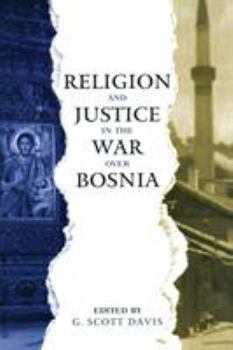Religion and Justice in the War Over Bosnia
Select Format
Select Condition 
Book Overview
This volume brings together a distinguished group of thinkers, working in ethics, religion and history, to explore moral and religious issues that underlie the violence in Bosnia.... This description may be from another edition of this product.
Format:Paperback
Language:English
ISBN:0415915201
ISBN13:9780415915205
Release Date:April 1997
Publisher:Routledge
Length:204 Pages
Weight:0.65 lbs.
Dimensions:0.5" x 6.0" x 9.0"
Customer Reviews
1 rating
Interesting look at Just War Theory but Weak on Nationalism
Published by Thriftbooks.com User , 22 years ago
In Religion and Justice in the War over Bosnia, editor G. Scott Davis compiles essays by five professors of religious ethics who consider the current Bosnian conflict within the schema of the "just war" theory. This "just war" tradition, as described by noted theorists Paul Ramsey and Michael Walzer, outlines the "just" reasons for engaging in warfare, and the proper manner in which war should be conducted. The former includes proper authority, just cause, just intent, last resort, and reasonable hope of success. The latter pertains to the use of proportion and discrimination in the prosecution of warfare (16). Davis admits that, before undertaking this project, he "had scant knowledge of the cultural and political history of Eastern Europe, much less of the Balkans" (viii). Davis assumed the role of a student in preparation for this enterprise by consulting such works as Fred Singleton's "A Short History of the Yugoslav People" and Barbara Jelavich's two-volume history on the Balkans. Two convictions on the part of Davis enters into this work--a distrust of nationalism, and an insistence that the West (particularly, the United States) should intervene militarily to end the hostilities against the Bosnian Muslims.Michael Sells' contribution to the study, "Religion, History, and Genocide in Bosnia-Herzegovina," is a critical account on Western views towards the Balkans. First, Sells establishes that war tactics on the part of the Bosnian Serbs is, in fact, genocide. The "unjust" intent of the Bosnian Serbs is to destroy the cultural memory of the Bosnian Muslims (26). Second, Sells analyzes the prevailing attitude of the West towards the war in Bosnia. Sells cites an appearance by then president Bill Clinton on Larry King Live during which Clinton referred to the hostilities in Bosnia as "age-old antagonisms" which "go back five hundred years, some would say almost a thousand years" (23). Robert Kaplan's "Balkan Ghosts" is criticized for repopularizing the idea that the Balkan peoples and cultures are "unamenable to civilized standards of behavior and locked in unchanging, perpetual tribal hatreds" (40). This belief that the Balkan peoples will always be involved in warfare is coupled with the idea that "there are no angels in the conflict" (41). According to Sells, the denial that civilized society is possible in the Balkans, and the prevailing conclusion that all sides in the Bosnian conflict are guilty causes the West to ignore the practices of cultural genocide against Muslim populations.In "Nationalism and Self-Determination: The Bosnian Tragedy," Jean Bethke Elshtain explains another reason for the lack of direct action by the West to stop atrocities in Bosnia. The problem is that the United Nations, for a time, did not recognize Bosnia as a sovereign nation. According to Elshtain, "the United Nations Charter [only] makes provision for response to violation of the territory of a sovereign state" (46). To Elshtain, this stand i






